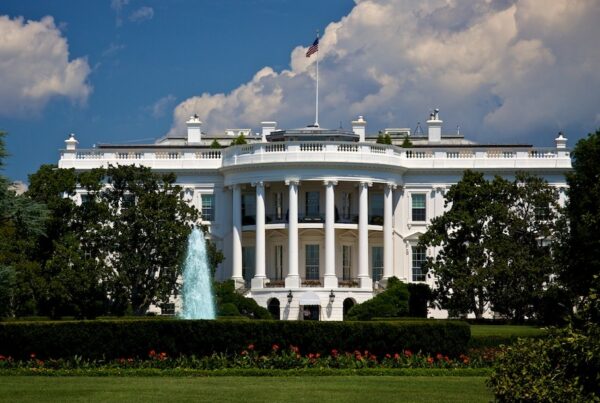Editor’s note: The Trump administration has recently declared English the official language of the USA while simultaneously cutting the provision of English language education services. This politicization of language and migration in the USA is being felt around the world.
To help our readers make sense of it all, we bring you a new occasional series devoted to the politics of language and migration.
Following on from Rosemary Salomone’s essay providing the historical and legal background, political anthropologist Gerald Roche today shows how the axing of language access service provision is an exercise in necropolitics – a use of power that leads to the suffering and death of certain groups of people.
***
On March 1st, 2025, President Donald Trump signed an executive order designating English as the official language of the United States of America. As a result, people are going to be harmed, and some will die.
There are direct and indirect reasons why this order will get people killed. Most directly, people will die as a result of this order because it will deny language access services to the more than 25 million people in the USA who need them. Apart from declaring English the USA’s official language, this order revokes Executive Order 13166 (August 11, 2000), which obliged US government agencies to provide language access services to people who need them.
Government agencies didn’t necessarily always fulfill their obligations under this order. But now, any motive they had to respect people’s language rights has been removed. Access to critical services will have life-threatening consequences in at least three arenas.
First, during natural disasters, such as fires, earthquakes, hurricanes, and floods, people require timely access to accurate information to have the best chance of survival. However, linguistic exclusion and discrimination are reproduced in how this information is provided to the public, resulting in what Shinya Uekusa calls ‘disaster linguicism’. Research during the recent LA wildfires by Melany De La Cruz-Viesca, showed that thousands of Asian Americans were denied access to disaster alerts and other information in their preferred language
Secondly, healthcare is another setting where language access is vital. When people’s language rights are respected in healthcare, they are more likely to use healthcare services, which are also more likely to be effective. When people’s language rights are violated, they are more likely to die in mass health incidents, such as pandemics. The individual consequences of linguistic exclusion can be seen in the case of Arquimedes Diaz, who called 911 after being shot, but was denied interpretation services for 10 minutes. Those crucial minutes were enough to leave him paralyzed. Any longer and he could have died.
A third area where people will be exposed to increased risk of death due to this executive order is the justice system. Sociolinguists such as Diana Eades, John Baugh, and many others have demonstrated that failures to account for linguistic differences lead to miscarriages of justice in police encounters, courtrooms, and elsewhere. This has life and death consequences particularly in the 27 states of the USA that still have the death penalty. However, we also need to take into account the fact that incarceration reduces life expectancy by 4 to 5 years, and that after incarceration, people experience twice the risk of death by suicide. Any miscarriage of justice on linguistic grounds that leads to imprisonment therefore has life and death consequences.
So, in disaster management, healthcare, and the justice system, the reduction or removal of language access services will directly expose people to harm and increased risk of death. There are also two additional, less direct ways that this order could lead to death.
First, we can look at the complex link between Trump’s official English order and death that particularly threatens Indigenous people. Trump’s order is almost certainly inspired by a law previously drafted by his vice-president, JD Vance: the English Language Unit Act of 2023. That proposed law included a clause stating that it could not limit Native Alaskan or Native American peoples’ use or preservation of their languages. The new order contains no such clause.
To understand why this is a problem and how it relates to death, we need to look more broadly at Trump’s record on Indigenous policy. During his first term, Trump carried out ‘continuous attacks’ on Indigenous communities, starting with a memo that reinstated construction of the Dakota Access Pipeline. Starting his second term, Trump signalled his hostility to Indigenous languages by using one of his first executive orders to wipe an Indigenous place name (Mount Denali) from the map. This prior hostility towards Indigenous communities, and Trump’s general austerity agenda, mean that Indigenous languages are likely to be underfunded during his second term. This will have life and death consequences, because decades of research has shown that language revitalization has health benefits, improves wellbeing, and reduces suicide rates.
Finally, Trump’s promotion of English and his hostility towards Indigenous peoples and languages should be viewed as part of a broader white supremacist agenda that has life and death implications for people of color. The push to make English the official language of the USA has always involved opposition to bilingualism, and often to specific languages: Jane Hill has noted how English-only movements often go hand-in-hand with efforts to limit the use and legitimacy of Spanish. These movements have gathered steam since the 1980s, and have consistently been associated with the right, and its more xenophobic, white-supremacist fringes: the linguistic fascists, as Geoffrey Pullum once memorably dubbed them.
Trump’s executive order effectively mainstreams the far-right linking of whiteness, English, and belonging in the USA. Asao Inoue has argued that the life-and-death consequences of this linkage start with the discursive circuits and communicative practices that shape judgments about whose language and life are considered valuable. But more directly, this order will legitimize the white supremacist practice of using perceived proficiency in English to target people for violence. We saw this in December 2024 in New York City when one person was killed, and another injured, after their attacker asked them if they spoke English. In another incident in July 2024, a man shot seven members of a family after telling them to “speak English” and “go back where they came from.” Trump’s official English order risks inciting similar acts of violence.
Taking all of this together, we can see that Trump’s executive order making English the official language of the USA will almost certainly harm people, and is also likely to lead to deaths. That’s why I think we need to take what I call a necropolitical approach to language – one that examines how language, death, and power intersect. A necropolitical approach demonstrates that designating English as the USA’s official language is not just a symbolic declaration, it is also, for some people, a death sentence.
Related content
In this episode of the Language-on-the-Move Podcast, Gerald Roche talks with Tazin Abdullah about his new book The Politics of Language Oppression in Tibet. Gerald is also a regular contributor to Language on the Move and you can read more of his work here.
For more content related to multilingualism in crisis communication, head over to the Language-on-the-Move Covid-19 Archives.







 This work is licensed under a
This work is licensed under a
This is a clear and coherent statement of the brute realities of language suppression.